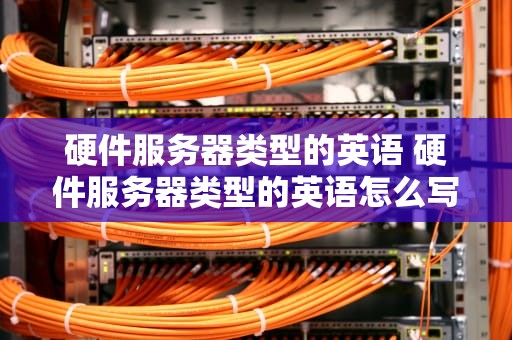In the ever-evolving world of technology, servers play a crucial role in supporting the operations of businesses and organizations. Understanding the different types of hardware servers available is essential for making informed decisions about infrastructure investments. This article delves into the various hardware server types, their functionalities, and the English terminology associated with them. Additionally, we will address several衍生问题 related to hardware servers to provide a comprehensive understanding of this topic.

1. What are hardware servers?
Hardware servers are powerful computers designed to handle multiple tasks simultaneously. They are equipped with high-performance processors, substantial memory, and storage capabilities to support the needs of multiple users or applications. Unlike personal computers, servers are built to provide centralized data storage, processing power, and network services.
2. What are the main types of hardware servers?
There are several types of hardware servers, each designed to cater to specific needs. Here are the most common ones:
a. File servers
File servers store, manage, and distribute files and documents across a network. They allow users to access shared files from different devices, making collaboration easier. The English terminology for file servers includes "network-attached storage (NAS)" and "storage area network (SAN)."
b. Application servers
Application servers host and manage applications that run on a network. They provide processing power and resources for running software applications, such as web servers, database servers, and email servers. Common English terms for application servers include "web server," "database server," and "email server."
c. Database servers
Database servers store, manage, and retrieve data from databases. They are crucial for applications that require efficient data management, such as e-commerce platforms, customer relationship management (CRM) systems, and enterprise resource planning (ERP) software. The English terminology for database servers includes "relational database management system (RDBMS)" and "NoSQL database."
d. Virtualization servers
Virtualization servers enable the creation of multiple virtual machines (VMs) on a single physical server. This technology allows for better resource utilization, easier management, and increased flexibility. English terms for virtualization servers include "hypervisor" and "virtual machine manager (VMM)."
e. Blade servers
Blade servers are compact, high-density servers designed to fit into a blade server chassis. They offer cost savings, reduced power consumption, and easier management in data centers. The English terminology for blade servers includes "blade server chassis" and "blade enclosure."
f. Cloud servers
Cloud servers are virtualized servers that reside in a cloud computing environment. They provide scalable, on-demand resources, allowing businesses to pay only for what they use. The English terminology for cloud servers includes "infrastructure as a service (IaaS)" and "platform as a service (PaaS)."
3. How do I choose the right hardware server for my needs?
Selecting the appropriate hardware server depends on various factors, including your organization's size, budget, and requirements. Here are some considerations:
a. Scalability: Ensure that the server can handle future growth and increased demand.
b. Performance: Evaluate the server's processing power, memory, and storage capabilities to meet your needs.
c. Reliability: Choose a server with redundant components and failover capabilities to minimize downtime.
d. Management: Consider the ease of managing and maintaining the server, including remote management and monitoring features.
e. Budget: Balance your budget with the server's capabilities to ensure a cost-effective solution.
4. What are some common issues with hardware servers?
Despite their robustness, hardware servers can encounter several issues. Here are some common problems and their English terminology:
a. Hardware failures: Components like hard drives, power supplies, and memory modules can fail, leading to server downtime.
b. Overheating: Insufficient cooling can cause the server to overheat, potentially damaging components.
c. Network issues: Network connectivity problems can disrupt server operations and prevent access to shared resources.
d. Security vulnerabilities: Unpatched software and weak passwords can expose servers to cyber threats.
5. How can I maintain my hardware server?
Proper maintenance is crucial for ensuring the longevity and performance of your hardware server. Here are some best practices:
a. Regularly update firmware and software to patch vulnerabilities and improve performance.
b. Monitor server performance and resource usage to identify potential issues early.
c. Implement backup and disaster recovery strategies to protect your data.
d. Perform routine hardware maintenance, such as cleaning fans and replacing worn-out components.
In conclusion, understanding the various hardware server types and their English terminology is essential for making informed decisions about your organization's infrastructure. By considering factors such as scalability, performance, and maintenance, you can choose the right server for your needs and ensure optimal performance and reliability.
随着互联网的普及和信息技术的飞速发展台湾vps云服务器邮件,电子邮件已经成为企业和个人日常沟通的重要工具。然而,传统的邮件服务在安全性、稳定性和可扩展性方面存在一定的局限性。为台湾vps云服务器邮件了满足用户对高效、安全、稳定的邮件服务的需求,台湾VPS云服务器邮件服务应运而生。本文将对台湾VPS云服务器邮件服务进行详细介绍,分析其优势和应用案例,并为用户提供如何选择合适的台湾VPS云服务器邮件服务的参考建议。

工作时间:8:00-18:00
电子邮件
1968656499@qq.com
扫码二维码
获取最新动态
